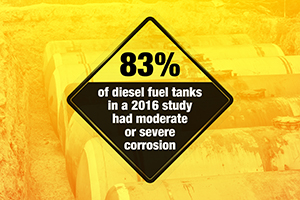Five Reasons Why a 5-Micron Filter Should Be Inside Your Fuel Dispenser

A 2018 industry survey of convenience store customers shows that a station’s reputation is playing a bigger role in a consumer’s decision to fuel at that station. However, delivering clean fuel to customers has become increasingly challenging, largely due to the influx of ultra-low sulfur diesel (ULSD).
There is one tool out there – the 5-micron filter – that represents a cost-effective solution for ensuring consumers receive consistently high-quality, clean diesel fuel.
New fuel efficiency and emissions compliance standards have resulted in new innovations in engine technology and changes to fuel composition over the past decade, which demand improved filtration of fuels as a fundamental quality control measure.
At the same time, each year, more mid-size and heavy-duty trucks powered by high-performance engines are being released. While more efficient and sophisticated than their predecessors, they are more vulnerable to fuel contamination from particulate or water. Even the smallest fuel contaminants can cause abrasion and long-term damage to these engines, which are made up of intricate, precision-crafted components.
From this perspective, installing a powerful dispenser filter needs to be considered a maintenance investment that promotes customer satisfaction. Here, we take a closer look at five things every fuel site operator should know about the value 5-micron dispenser filters bring to fueling operations.
1. Five-micron dispenser filters protect sensitive engines from harmful particulate.
As high-performance diesel engines become ever more sophisticated, operators who can consistently provide reliably clean fuel will be in high demand. The quest for exceptional fuel economy and reduced emissions has led to remarkable advances in engine technology, such as the High Pressure Common Rail fuel injection system. Five-micron dispenser filters play a crucial role in protecting the injection system’s delicate components, which can be damaged by particulate as small as 7 microns in fuel. Improved dispenser filtration through the use of a 5-micron filter can help fuel site operators protect these vital engine systems.
2. Incidents of tank corrosion, particularly in diesel tanks, are on the rise.
While ultra-low sulfur diesel has decreased toxic sulfur emissions, unintended consequences such as the corrosion of underground storage tanks are creating both infrastructure and product quality challenges for fuel operators. Chemical reactions occur that result in corrosion of equipment, which leads to particulate inside the tank. According to the Environmental Protection Agency, 83% of diesel fuel tanks in a 2016 study exhibited moderate or severe corrosion. In some cases, corrosion has been reported in as little as six months, which can severely damage the tank and other system components. Installing a 5-micron dispenser filter can not only prevent the distribution of small particulate into automotive engines, the filter will help protect dispenser components from abrasion.
3. The Clean Diesel Alliance recommends using 5-micron dispenser filters.
The Clean Diesel Alliance provides recommendations on managing fuel systems that dispense ultra-low sulfur diesel (ULSD) in “Guidance for Underground Storage Tank Management at ULSD Dispensing Facilities.” In the document, the organization recommends that fuel site operators install 5-micron filters to prevent particulate matter suspended in diesel from being dispensed into vehicles.
4. Five-micron filters with water sensing capabilities detect and absorb water and water-related contamination.
Water is a chronic challenge for fuel site operators, particularly those dispensing ULSD. Microbial contamination develops in the presence of water and food (fuel). Microbes eat the organic compounds in the fuel, which causes ULSD to degrade. This can lead to serious problems in the storage tank, such as corrosion. Five-micron filters with water-sensing capabilities can give fuel operators a real advantage. Signs of microbial contamination in the tank include a sulfur smell in the fuel or filter, corrosion of metal filter or covering, or spotted water or brown/black particulate matter gathering on the filter.
5. Five-micron filters help fuel retailers develop loyalty among a growing customer base through clean fuel.
Sales of light-duty trucks are on the rise. Case in point: Ford’s F-Series truck was the top-selling vehicle in 2017, and the automaker is introducing a diesel V6 engine for its popular F-150 lineup in 2018. Installing a 5-micron dispenser filter to catch harmful particulates is critical for maintaining and growing customer loyalty.
A New Approach to Filtration
PetroClear dispenser filters offer increased peace of mind for fuel operators. In particular, PetroClear’s 5-Micron 40505W-AD Particulate Removing and Water Sensing dispenser filter is designed to capture particulates as small as 5 microns, helping to prevent particulates from entering into vehicle fuel injection systems, including high-performance diesel engines designed to meet stringent emissions standards.
Filters that chronically clog are an indication of serious problems inside the fueling system. If you experience this at your fuel site, consult with a reputable compliance management company to determine the root cause of the problem.





